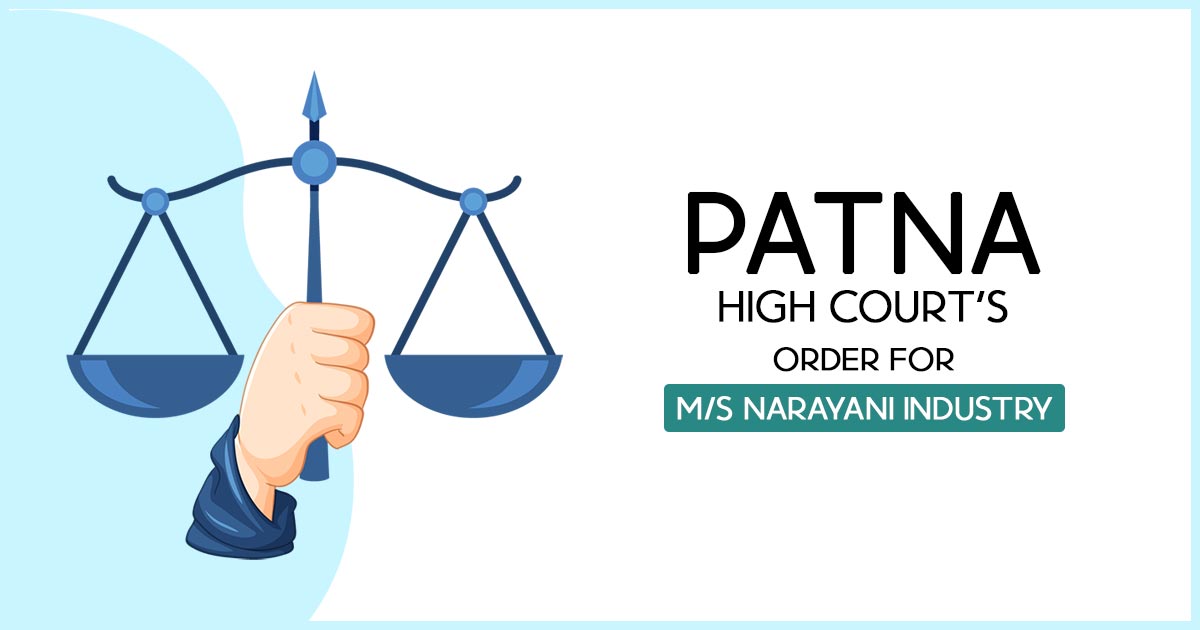
The Patna High Court has made an important decision regarding the constraints of Article 226 of the Indian Constitution in cases related to the Bihar Goods and Services Tax Act, 2017 (BGST). According to the court’s ruling, if a law specifies a particular time period for allowing delays, the Appellate Authority under Article 226 cannot extend this predefined duration.
The case in question pertained to M/s Narayani Industry, a Partnership firm, which was subject to the BGST Act. The petitioner was dissatisfied with the assessment order that determined tax obligations under both the Central Goods and Services Tax Act, 2017 (CGST) and the State Goods and Services Tax Act, 2017 (SGST), as well as the linked interest and penalties.
Three appealable orders have been obtained by the petitioner received on March 4, 2023, March 10, 2023, and March 18, 2023, all falling under Section 107 of the BGST Act. Nevertheless, Sub-section (4) of Section 107 stipulated a three-month window for submitting appeals, with an additional one-month allowance for delayed appeals, provided valid reasons for the delay were presented.
On 18.03.2023 the last of these orders permitted for the petition to get filed till 17.06.2023 and the extension till 16.07.2023 was open for filing the late appeal with the justifiable causes.
The court observed that the petitioner did not pursue the appeal process within the specified timeframe and instead approached the Patna High Court using Article 226 after the appeal period had expired, all without submitting a request for extending the deadline.
Furthermore, the court acknowledged the limits of the authority granted by Article 226 of the Constitution of India to interfere with appealable orders, as established by the Supreme Court in the case of State of H.P & Ors. v. Gujarat Ambuja Cement Limited & Anr.; (2005) 6 SCC 499.
In this case, it was emphasized that if a taxpayer approaches the High Court without utilizing the alternative remedy, it must be demonstrated that the taxpayer has a compelling case or that there are substantial reasons to invoke the exceptional jurisdiction. While reiterating that Article 226 of the Constitution confers extensive powers upon the High Court, it was clarified that the writ remedy is, nevertheless, a completely discretionary recourse.
The court articulated that, “The High Court, hence, can always refuse the exercise of discretion if there is an adequate and effective remedy elsewhere. The High Court can exercise the power only if it comes to the conclusion that there has been a breach of principles of natural justice or due procedure required for the decision has not been adopted.
Read Also: Buyers Can’t Claim GST Credit If Suppliers Fail To Pay Tax To Govt
The High Court would also interfere if it comes to a conclusion that there is an infringement of fundamental rights or where there is a failure of principles of natural justice or where the orders and proceedings are wholly without jurisdiction or when the vires of an Act is challenged. There is no such plea made by the petitioner in the present case against the impugned order.”
“Having not availed the statutory remedies available, the petitioner cannot seek to approach this Court under Article 226 of the Constitution of India to challenge an assessment order, especially with respect to the computation of the turnover and the determination of the taxable turnover and the tax payable, as arrived at by the Assessing Officer. In the BGST Act, an appellate remedy is provided under Section 107, which has to be availed within a period of three months or with a delay within a further period of one month,” the Court stipulated.
As per the court, it is a trite law that if there is a particular duration of delay condonation furnished there could not be any extension of the stated duration via the appellate authority or by this court under Article 226 of the Constitution.
The Court held, “We find that there is no jurisdictional error, violation of principles of natural justice or abuse of process of law averred or argued by the petitioner in the above writ petition. From the records produced before us, it is clear that an inspection was conducted on the premises of the assessee and the same was also found locked. The assessee claims that his stock was kept in another go-down; which should have been informed to the GST Tax Authorities.”
“It was in this circumstance that an assessment was made and there is no ground stated in the writ petition which would enable invocation of the extraordinary remedy under Article 226; as has been delineated in Gujarat Ambuja (supra). The petitioner only makes a bland assertion of violation of fundamental and legal rights guaranteed to the petitioner under Articles 14, 19(1)(g) and 300A of the Constitution of India without any substantiation,” it added during dismissing the writ petition.
A division bench of Chief Justice K. Vinod Chandran and Justice Partha Sarthy furnished the aforesaid verdict.
| Case Title | M/s Narayani Industry Vs. The State of Bihar |
| Citation | Civil Writ Jurisdiction Case No.11333 of 2023 |
| Date | 11.08.2023 |
| For the Petitioner/s | Mr.Mohit Agarwal, Advocate |
| For the Respondent/s | Mr.Vikash Kumar (SC-11) |
| Patna High Court | Read Order |









